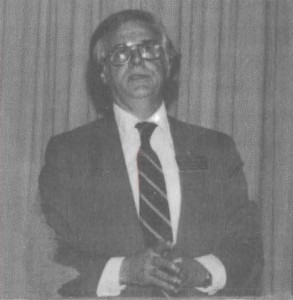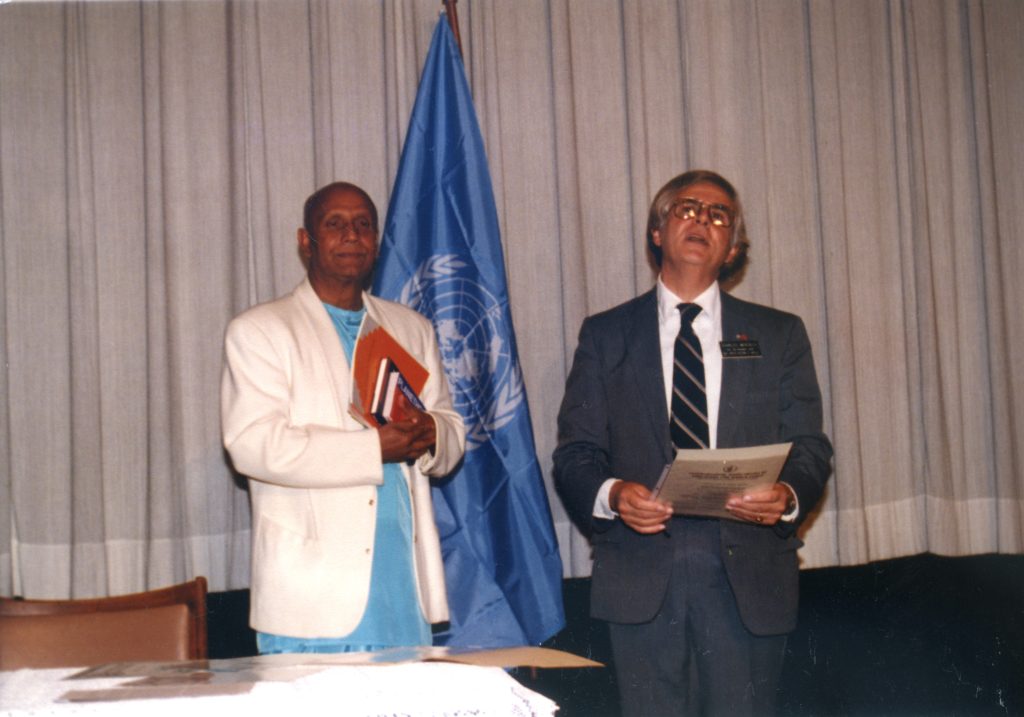International Association of Educators for World Peace and Award Presentation
Filed under Other Awards, Citations, PresentationsOn 22 February 1991 , Professor Charles Mercieca , Founder and Executive Vice-President of the International Association of Educators for World Peace, was the guest speaker at a meeting of the Peace Meditation at the United Nations. After explaining the background and philosophy of his organisation – whose more than 20, 000 members are dedicated to the idea of using education as a tool for world peace – Dr. Mercieca presented Sri Chinmoy with four awards in recognition of his work for peace. Following are excerpts from his speech.
 Professor Charles Mercieca, Founder and Executive Vice President, International Association of Educators for World Peace: First of all, I want to tell you how I got involved in peace work. It did not just happen. I come from the island of Malta. When I was five or six years old, the Second World War started. Some of you may recall that Malta was the most bombarded country in World War Il.
Professor Charles Mercieca, Founder and Executive Vice President, International Association of Educators for World Peace: First of all, I want to tell you how I got involved in peace work. It did not just happen. I come from the island of Malta. When I was five or six years old, the Second World War started. Some of you may recall that Malta was the most bombarded country in World War Il.
Every week another village or town was demolished by bombardment. I was playing with relatives of mine one day, and the next day 6 I saw them dead. At that age I could not figure out why these things were happening. I made up my mind that if I survived the war, I would do something in my life to avert or at least postpone the repetition of a similar experience for others.
After I graduated-I earned three degrees, including a Ph.D.-I kept on studying, going from university to university and from country to country until finally I accumulated what I thought was enough experience to start working. From 1967 to 1969, I decided to see for myself what teachers in the world think about world peace. I feel that the philosophy of Sri Chinmoy is actually what the new generation of teachers is looking for-something that fills them from the inside, and not giving them everything from the outside while leaving them empty on the inside.
The International Association of Educators for World Peace came into existence in 1969. Now the organisation has over 20,000 members in 58 countries.
Peace, of course, is a product of attitudes. It is not something found in Heaven or in a particular place, such as a church . Peace is something that is found inside the individual person. You have to bring it forward from the inside. The germ of peace is in every person. Even the most wicked people on earth also have the germ of peace inside them, although it may be suffocated . It may be covered with rust and dust so deep that you cannot even suspect that it is there, but it is there. Peace education is the process of bringing out the germ of peace so that it can grow and develop.
Unless teachers are trained in peace education, the schools, colleges and universities in this nation and in all countries can never be used as effective instruments to promote peace on earth.
Education for peace does not consist of a series of lectures exhorting listeners to lead a good life. It does not consist of a set of courses in human relations offered by a university to get credit for graduation. It does not consist of conventions 7 organised by civic organisat ions whose sole purpose is to obliterate war . It does not consist of teaching and promoting a traditional set of values. It does not consist of trying to create a utopian society which enjoys the utmost perfection of laws, politics and social relations. It does not consist of training a society to become willfully and voluntarily subservient to the state, or indoctrinating the bulk of the population with certain political, philosophical or religious beliefs, or of building a peaceful society while ignoring completely the past history of human conflicts, which led constantly to hatred and war.
On the contrary, education for peace means the capability to solve every problem one encounters in life without resorting to violence. It means the determination to succeed in life not at the expense of others. It means the full control of man’s aggressiveness in social relations. It means the development of individual responsibility that would enable an entire nation to become self-sufficient. It means the restructuring of educational priorities so as to make peaceful living the most important element of the educational process.
Education for peace means the promotion of cultural understanding for a better understanding of human behaviour. It also means the implementation of a philosophical system that puts top priority on the universal welfare of people. Seneca, the philosopher who lived nearly 2,000 years ago, in the year 42 A.D., said there would never be peace on earth unless we educate every person to look at the world and say, “Omnis orbs terrarum patria mea est, ” which means, “The whole world is my native land.” We must first be citizens of the world. Our allegiance must go first to planet earth and then to the country to which we belong, because without the planet earth, there would not be any United States, China, India, Malta or France. Planet earth is more important than an individual country. The whole is more important than the part.
Now it is my great pleasure to present a few awards to Sri Chinmoy. The first is a Diploma of Honour from the World 8 Peace Academy, a division of the International Association of Educators for World Peace. This· Diploma, which is recognised by the United Nations, is given to Sri Chinmoy in recognition of his support for the ideals of world peace through understanding, communication and a firm commitment to resolve issues by negotiation.
The next award I would like to give to Sri Chinmoy is the Diploma of Honour of the Association. When the Association was started, this was the first award that we instituted. We wanted to give it to special people whose presence influences the whole world. And I’m glad to tell you all, especially Sri Chinmoy, that U Thant was one of the persons who received this Diploma of Honour. Pope Paul VI, who came here to the United Nations, also received this award. It is given “in recognition for outstanding service to the community and notable concern for all people. ”
The next award I would like to give Sri Chinmoy proclaims him “Dharmaraja,” which means “King of Dharma. ” He is only the second person to receive this award; the first person to receive it was Dr. Seo Kyung Bo, who was the head of the Zen Buddhists in Southeast Asia and is now the Plenipotentiary Envoy of the International Association of Educators for World Peace to the United Nations. To receive this award, a person must be not just spiritual, but far, far above the rest. That is why we do not give this award very often.
And the last award I would like to offer to Sri Chinmoy is called the “Fountain of Universal Peace Award.” He is the first person to receive it. You know what a fountain is: from it water constantly flows out. Water symbolises life. So the “Fountain of Universal Peace” is a person from whom peace emanates; peace flows out constantly from him to others. We felt it was very appropriate that Sri Chinmoy would be the very first one in the history of our organisation to receive this award. Thank you.
Appears in : Meditation at the United Nations – 1992 Jan – Mar, Periodic Bulletin
